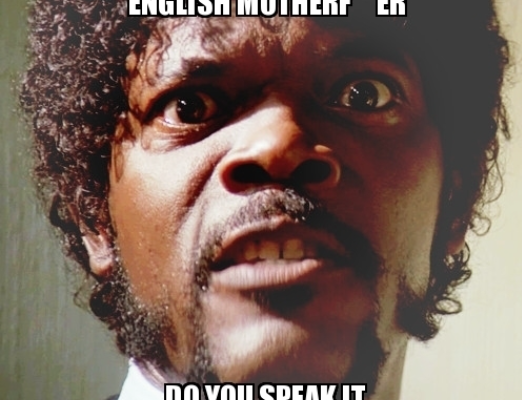“English, Motherf**er, do you speak it?” is an iconic line from Quentin Tarantino’s “Pulp Fiction,” delivered by Samuel L. Jackson’s character, Jules Winnfield. This memorable quote encapsulates the film’s blend of dark humor and intense dialogue, reflecting the broader themes of morality, redemption, and the absurdities of life.
“Pulp Fiction,” released in 1994, revolutionized independent cinema with its nonlinear narrative, rich character development, and sharp, quotable dialogue. The film weaves together multiple storylines involving hitmen, a boxer, a gangster’s wife, and a pair of armed robbers, creating a tapestry of interconnected lives and moral quandaries.
Jules and his partner Vincent Vega (John Travolta) are two hitmen whose conversations often delve into philosophical musings, pop culture references, and existential dilemmas. The infamous line occurs during a tense scene where Jules confronts a group of young men in a diner, emphasizing themes of communication, understanding, and the often violent consequences of misinterpretation.
Tarantino’s writing style is marked by its intricate wordplay and a unique blend of the mundane and the profound. The dialogue flows with a rhythm that feels both natural and stylized, drawing audiences into the characters’ world. This particular moment serves as a powerful reminder of the importance of language and clarity in a world rife with chaos and violence.
Beyond its immediate shock value, the line prompts viewers to consider deeper questions about identity and culture. It highlights the barriers people face in understanding one another, not just linguistically but also on a more profound human level. Jules’s demand for recognition and comprehension resonates with anyone who has ever felt unheard or misunderstood.
The impact of “Pulp Fiction” extends far beyond its runtime. It reshaped the landscape of 90s cinema, influencing countless filmmakers and spawning a plethora of imitators. The film’s success helped elevate the status of independent films in Hollywood, showcasing how compelling storytelling and strong character arcs can capture audiences’ imaginations.
Moreover, the quote itself has entered the cultural lexicon, often referenced in discussions about language and communication. It serves as a reminder that effective dialogue is crucial, whether in life or cinema. The film’s exploration of morality, choice, and consequence, underscored by its memorable lines, encourages viewers to reflect on their own lives and decisions.
In conclusion, “Pulp Fiction” and its unforgettable quotes, like “English, Motherf**er, do you speak it?” continue to resonate in popular culture. They challenge audiences to confront uncomfortable truths while celebrating the power of language in shaping our understanding of one another. Through its iconic moments and compelling narratives, Tarantino’s film remains a cornerstone of modern cinema, inviting ongoing discussion and reflection.



